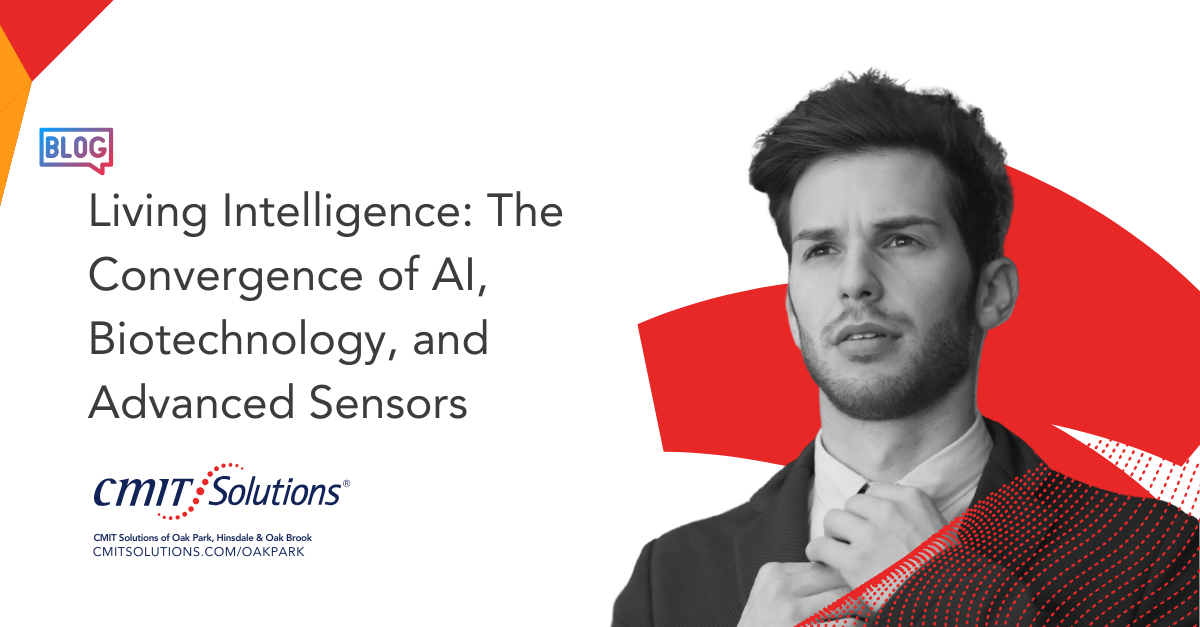Introduction: The Age of Living Intelligence
The boundaries between artificial intelligence, biological systems, and sensor technologies are rapidly dissolving. We are entering a new era of Living Intelligence—a paradigm where machine learning models, biosensors, and biotechnology not only interact but evolve together. This convergence is unlocking possibilities in personalized healthcare, smart environments, sustainable agriculture, and secure enterprise infrastructure.
For businesses and tech-forward organizations like CMIT Solutions of Oak Park, Hinsdale & Oak Brook, understanding and preparing for this shift is crucial. By leveraging the power of AI, biosensing technologies, and integrated platforms, businesses can future-proof operations, enhance data security, and offer smarter services to clients and communities alike.
The Convergence: Where AI Meets Biology
Living intelligence represents the next chapter in technological evolution. Unlike traditional systems that operate in isolated silos, it combines the pattern-recognition power of AI with the sensing capabilities of biological and environmental monitors. This integration includes:
- AI-driven bioinformatics platforms
- Wearable and implantable sensors
- Real-time health monitoring
- Environmental feedback loops
- Adaptive cyber-physical systems
Just as strategic IT guidance helps businesses adapt and thrive, living intelligence provides a blueprint for building responsive, intelligent ecosystems.
Biotechnology’s Evolution Through AI
Biotech companies now use AI not just for processing lab results, but for actively designing drugs, therapies, and diagnostics. Deep learning models predict how proteins fold, identify genetic mutations, and personalize medicine in ways never seen before.
Key breakthroughs include:
- CRISPR-driven genome editing enhanced by AI
- AI algorithms identifying cancer markers in bio-samples
- Precision medicine tailored using genetic data
Such advancements require advanced computing and cloud services to process massive biological datasets securely.
Advanced Sensors: From Passive to Predictive
Today’s sensors do more than collect data—they think. Smart biosensors detect glucose levels, neurological activity, or environmental toxins and send insights directly to AI platforms. Integrated with network management, they create intelligent feedback systems that respond in real time.
These sensors are embedded in:
- Smartwatches and wearable medical devices
- Smart agriculture monitoring systems
- Implantable neural interfaces
- Industrial IoT networks
With the right IT procurement, companies can deploy secure, scalable sensor ecosystems that generate meaningful intelligence.
Practical Applications for Businesses
-
Healthcare Transformation
AI-powered biosensors allow for continuous patient monitoring, reducing hospital visits while enabling real-time responses to emergencies. Combining these tools with data backup systems ensures health records are securely stored and accessible when needed.
-
Smart Workspaces
Imagine office environments where AI adjusts lighting, air quality, and temperature based on real-time employee biosignals. Such intelligent environments can enhance productivity and well-being.
-
Predictive Maintenance
Sensors on equipment send alerts about potential failures. When combined with machine learning models, businesses can act preemptively, cutting costs and downtime.
-
Secure Communications
Sensor data and biometric authentication can elevate unified communication by verifying identity and reducing unauthorized access.
-
Environmental Monitoring
In agriculture and manufacturing, AI-integrated sensors can track CO2 levels, soil health, or emissions—enhancing sustainability and compliance.
Challenges and Considerations
Despite its promise, living intelligence introduces several challenges:
- Data privacy: Biological data is sensitive and must be protected under evolving regulations
- Cybersecurity threats: More endpoints mean greater vulnerability—requiring multi-layered security
- Integration complexity: Unifying biological and digital data streams is complex and costly
- Legacy system limitations: Older infrastructure may not support advanced AI or sensor integrations
That’s why proactive managed IT packages are key to navigating these challenges.
Enhancing Cybersecurity in Bio-AI Systems
Biological data flowing through AI systems must be protected. Emerging threats—like AI-driven spoofing or bio-signal hijacking—make traditional protections insufficient. Companies should consider:
- Cybersecurity compliance
- SIEM tools for real-time threat detection
- Endpoint security solutions
CMIT delivers layered protection through tailored cybersecurity roadmaps built around living systems.
The Role of AI in Ethical Biosensing
Ethics in AI isn’t just a buzzword—when biology and AI meet, it’s essential. Systems that process biological data—such as heartbeat, genetic sequences, or neural signals—touch the core of personal identity. This makes questions about consent, surveillance, and algorithmic bias more than theoretical concerns.
To ensure responsible innovation, businesses and technology providers must take a transparent, inclusive, and privacy-first approach to biosensing. This includes:
- Transparent AI algorithms: Make decision-making explainable and auditable.
- Consent-based data collection: Ensure individuals understand and agree to how their data is used.
- Independent oversight: Involve regulatory and ethical bodies to assess and approve data handling.
- Bias mitigation strategies: Prevent discriminatory outcomes by testing datasets across diverse demographics.
- Privacy-enhancing technologies: Utilize encryption, anonymization, and secure multi-party computation.
By embedding these best practices into every stage of development, organizations not only protect users but also build trust in their brand. With IT strategy transformation at the forefront, CMIT Solutions of Oak Park, Hinsdale & Oak Brook helps businesses implement AI solutions that are as ethical as they are effective.
Looking Ahead: The Living Future
In the next decade, expect AI-powered biosensing systems to become ubiquitous—from wearable wellness tech to emotion-aware enterprise dashboards and AI-assisted diagnostics. These tools will not only improve healthcare outcomes and productivity, but also reimagine how we interact with our environments and one another.
Business operations will evolve through the integration of these technologies:
- Workplace optimization: Smart offices that respond to real-time stress or fatigue signals.
- Healthcare innovations: AI that detects disease precursors before symptoms appear.
- Emotional AI: Interfaces that adapt tone and content based on user mood.
- Adaptive interfaces: Devices that modify controls based on physical or cognitive state.
The organizations that embrace this change early will emerge as leaders in innovation, trust, and operational excellence. However, it requires foundational support—something CMIT Solutions of Oak Park, Hinsdale & Oak Brook excels at. We provide:
- Reliable cloud platforms for scalable processing
- Future-ready IT strategies aligned with evolving tech
- Strategic IT assessments to ensure infrastructure readiness
Conclusion: Evolve with Intelligence
Living intelligence isn’t just futuristic—it’s already reshaping industries, ecosystems, and human experiences. The convergence of AI, biotechnology, and sensors offers unmatched possibilities—yet demands ethics, foresight, and strategy.
For forward-thinking businesses, this convergence offers more than a technological edge—it provides a way to deliver better health outcomes, smarter services, and more secure systems. But navigating this complexity requires trusted expertise.
With CMIT Solutions of Oak Park, Hinsdale & Oak Brook as your technology partner, your company can adapt confidently to these changes. From aligning your infrastructure with the demands of biosensing to integrating ethical AI, we help you evolve—not just intelligently, but responsibly.
Let’s prepare for the future—intelligently, ethically, and securely.






